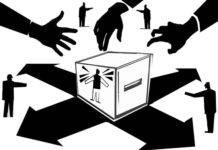A failure to communicate

The chaos and corruption in the communication sector will cost us dearly
I had a bitter experience during my recent visit to Bangladesh, Dhaka in particular, which is a crowded city with some of the most chaotic traffic in the world. Dhaka is now the biggest city in Bangladesh, where proper planning has remained absent since the city was first conceived.
During the Mughal period, “Dacca” was the capital of Bengal. Self-imposed Field Marshal Ayub Khan, former president of Pakistan, took an initiative to build Dhaka as a second capital but did not complete the process. American architect Louis Kahn was assigned to build the second capital (the same person who designed the Jatiya Sangsad Bhaban in collaboration with his student Mazharul Islam).
Traffic congestion in the capital city could be tackled if proper planning in conducting traffic was carried out.
To that end, our roads could be divided into three phases where buses should be allowed to ply in the first row, while cars and auto rickshaws in the second row, and rickshaws in the third row. This will ensure that there is little to no deviation.
Whoever violates the rule should be penalized severely.
If you haven’t noticed already, traffic light posts all but cover the city, but they are hardly effective at controlling the flow of traffic. Traffic is usually controlled by police personnel, with the exception of the Cantonment area. Drivers meticulously follow traffic lights while passing through the cantonment area.
Which proves that discipline is, indeed, possible.
There is a need to strictly follow rules and regulations while granting driver’s licenses. No amount of bribery should be allowed in granting the driver’s license. Test of the driver should be conducted by a panel of at least three individuals.
Recently, at a conference of Bangladeshi diplomats posted in European countries in London, Prime Minister Sheikh Hasina called upon them to invite foreign investment in the country and increase trade.
Being an LDC that is making progress towards attaining developing county status, Bangladesh depends on foreign investment for its economic development.
Under the existing anarchic traffic system, a foreign investor spends two hours on the road to reach the export promotion bureau at Motijheel to find regulation for investment in the country. The impression they carry back will not be congenial for investment. Water pollution in Dhaka the city makes life miserable, and WASA is subjected to complaints by the public in supplying polluted water.
In May, WASA authorities admitted that its water was polluted in 57 areas because of broken supply lines. While travelling from Khilgaon to Cantonment via Gulshan we often see a pool of water known as Hateerjheel Lake, which passes through Rampura to Gulshan — but the water seem to be contaminated. It is understood that a plan is being prepared with the help of Australia to get rid of the bad smell that emanates from the lake.
As of now, Bangladesh stands behind India in terms of FDI. According to the UN, our foreign direct investment stood at $3.61 billion in 2018.
Both Japan and China are investing in the country in large scales, but corruption in the country has caused further obstacles when it comes to investment. According to Transparency International Bangladesh, the nation experiences aggressively high levels of corruption in all sectors, posing significant challenge for foreign investment in the country.
A good communications network plays a vital role in the business sector. If that system is disrupted, business will be hampered. It is heartening to note that the present administration in Bangladesh has undertaken a number of projects to improve the communications system in the country.
The government has undertaken construction of the metro rail and several bridges and tunnels, in addition to developing special economic zones across the country. GAN Business Anti-Corruption Portal is of the opinion that “corruption is pervasive at all levels of the society and companies have reported being subjective to costly unnecessary license and permit requirements.”
No amount of diplomacy will work unless corruption is eradicated and regulation and procedure for investment is streamlined. Therefore, there is a need for positive action to stop corruption at all levels, including the security sector, in addition to simplifying regulations for investment. λ
Mohammad Amjad Hossain is a retired diplomat from Bangladesh and former President of the Toastmaster International club of America. He writes from Virginia.









